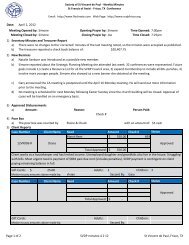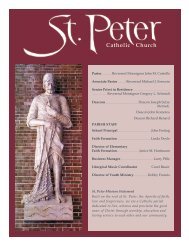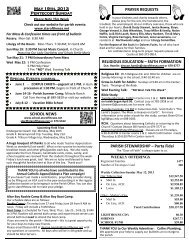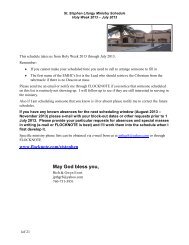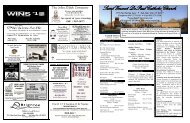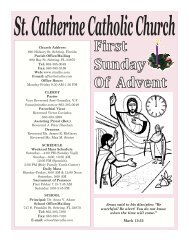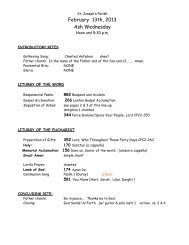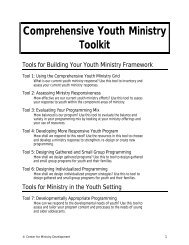You also want an ePaper? Increase the reach of your titles
YUMPU automatically turns print PDFs into web optimized ePapers that Google loves.
Page 22 MAY <strong>2013</strong> The <strong>Angelus</strong><br />
BISHOP EARTH DAY<br />
(From 2)<br />
from within us. This light of faith begins with the beautiful<br />
gift of Baptism, and each day we need to call upon<br />
this initial grace to help us to be good disciples, and to<br />
let our light shine forth to others.<br />
We need first of course, to develop and nurture our<br />
own faith, less what we seem to have been taken away.<br />
Then we need to share our faith with others in word and<br />
action. In this way, we will be given even more of what<br />
we have: faith and life in Christ.<br />
Other ways to grow in faith:<br />
• Assist more often at Holy Mass, and celebrate frequently<br />
the Sacrament of Reconciliation.<br />
• Spend some quality time each day in prayer.<br />
• Read each day some of the Sacred Scriptures, especially<br />
the readings that are used at daily Mass.<br />
• Reflect on our Holy Father’s letter to begin the year of<br />
faith – Porta Fidei, The Door of Faith.<br />
• Become familiar with the Catholic Catechism, and learn<br />
how to not only love our faith but how to defend our<br />
faith.<br />
• Become more familiar with the people who lived lives<br />
of faith with fidelity by reading the lives of saints.<br />
• Intensify and increase the witness of charity by doing<br />
random acts of kindness, random acts of generosity.<br />
• Speak to others about our faith. There is nothing more<br />
personal than a personal testimony of faith.<br />
VATICAN<br />
(From 5)<br />
sacred ministry, according to needs in<br />
different parts of the Church? 2,120 to<br />
525<br />
Based on these votes, it is hard to see<br />
what the problem was in the first place.<br />
There was agreement in principle on<br />
some critical and controversial issues.<br />
Among those issues, collegiality was special.<br />
The bishops, by their presence at the<br />
Council and their active participation in<br />
it, were actually experiencing collegiality.<br />
It was for them now part of their lived<br />
reality. In principle, collegiality had<br />
achieved secure and central status as a<br />
way the Church operates – or is supposed<br />
to operate.<br />
This vote, however, stuck in the craw<br />
of the minority. They opposed collegiality<br />
and they were almost 20% on this particular<br />
issue. This left plenty of room to<br />
maneuver.<br />
While there is much we do not know, it<br />
seems that the procedural issue under all<br />
the procedural issues was the role of the<br />
pope himself. Remember that we said<br />
that for most of the councils, the pope<br />
was not even present. Perhaps we are<br />
finding out why and that it was a good<br />
move for the pope not to be present.<br />
While all this was going on, the schema<br />
On the Church was being discussed on<br />
(From 7)<br />
Earth Day means taking<br />
of the Earth, the animals,<br />
and each other.<br />
Earth Day is a day for<br />
remembering God's great<br />
creation.<br />
Earth Day is a time to<br />
think twice about doing<br />
anything that will damage<br />
God's beautiful land.<br />
Earth Day means working<br />
together to clean land<br />
pollution, air pollution,<br />
and water pollution.<br />
Earth Day is a time to be<br />
grateful for God's creation<br />
and repay his kindness by<br />
taking care of the Earth.<br />
Earth Day is a day of<br />
peace, kindness, and love<br />
for one another because<br />
we are God's creation.<br />
Earth Day is a time to<br />
remember the three “Rs”:<br />
reuse, reduce, and recycle.<br />
the floor of the Council. They took up<br />
chapter 3: On the People of God, and<br />
Especially the Laity. There was one long<br />
sentence which summarized the thought:<br />
“Pastors were instituted in the Church not<br />
so that they take upon themselves the<br />
whole burden of building up the Mystical<br />
Body of Christ but that they might nourish<br />
and govern the faithful in a way that<br />
would result in everybody cooperating<br />
together in accomplishing the common<br />
task.” This is a reconciliation between the<br />
horizontal and the vertical dimensions in<br />
the Church.<br />
There were many objections when the<br />
priesthood of the baptized was spoken of.<br />
To some it seemed like another concession<br />
to the Protestant observers, for all<br />
knew that Luther advocated the priesthood<br />
of all believers. Cardinal Siri asked<br />
specifically that the praise of the laity be<br />
toned down a little. Encouragement is a<br />
good thing, he said, but it should not go<br />
overboard.<br />
Cardinal Suenens delivered a stirring<br />
speech on charisms in the Church, asking<br />
that the chapter be expanded to deal with<br />
them more extensively. Certainly reverence<br />
and obedience are due to pastors,<br />
but equal reverence is due to those in the<br />
Church impelled by the Spirit – and they<br />
are often lay people. He ended by saying:<br />
Increase the number of lay auditors and<br />
Students created an “I love Earth” flip chart. Representing the 3K class are Ava and Alexa<br />
Pena and Matthew Mata. (Courtesy photo)<br />
seeing to it that this increment included<br />
women, “who, if I am not mistaken,<br />
make up half of the human race. Chapter<br />
two then became The People of God. The<br />
final result was eight chapters, with one<br />
chapter on eschatology.<br />
There was the nagging question as to<br />
whether the Virgin Mary should be incorporated<br />
into the schema on the Church or<br />
have a separate schema. Devotion to<br />
Mary was at an all time high around the<br />
beginning of the Council and so some<br />
bishops thought that it would be a slight<br />
to Mary not to give her a schema of her<br />
own, and they looked with suspicion on<br />
those who did not want a separate chapter.<br />
Many of the bishops saw the<br />
Council’s focus as centering piety on the<br />
Bible and the public liturgy of the Church<br />
rather than on devotions, including<br />
Marian devotional practices, which often<br />
seemed to have a life apart from<br />
Scripture and liturgy. Certainly further<br />
promotion of Mary’s prerogatives would<br />
create another obstacle in the ecumenical<br />
movement.<br />
To help settle the dispute, one cardinal<br />
was chosen from each side to present the<br />
arguments and this took place October<br />
24. The vote was very close. The majority<br />
had only 41 more votes than the<br />
minority. By the way this vote took place<br />
one day before the five-part vote we discussed<br />
earlier. So the end result was<br />
another chapter in the schema On the<br />
Church concerning the Virgin Mary, the<br />
preeminent member of the Church.<br />
On November 5, the Council took up the<br />
schema on the bishops. This dealt largely<br />
with nuts-and-bolts issues – the relationship<br />
of bishops to the Roman<br />
Congregations, the role of auxiliary and<br />
coadjutor bishops, the competence and<br />
organization of bishops conferences and<br />
so on. As it turned out, the commission<br />
on bishops had not met even once in full<br />
session since December of 1962 and the<br />
re-working was done by one man. And<br />
this brought much criticism even by<br />
members of the commission on bishops.<br />
Like so many others, this schema<br />
received the usual criticism that it was<br />
too juridical and not pastoral enough and<br />
it took no account of collegiality and presumed<br />
that the rights of bishops were<br />
received from the pope, not from ordination.<br />
Surprisingly, the bishops voted to<br />
accept the text as the basis for discussion.<br />
The next two days were spent on chapter<br />
1, the relationship between the Curia and<br />
the bishops. Sparks were flying because<br />
every bishop had had experience with the<br />
Curia, good, bad or both, so all felt competent<br />
to speak.





